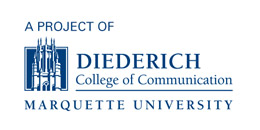
A guest speaker discusses racial stereotypes during a class in the Community Health Workers Training Program, which teaches trainees to bring health education and expertise to the communities they serve. (Photo provided by Azure’De Williams)
Po Too knows what it’s like to come to America for the first time.
She’s experienced the struggles of adjusting to a language barrier, a different culture and unfamiliar surroundings.
Too, 28, first came to Wisconsin 14 years ago. She and her family fled Burma, now Myanmar, and spent years in a refugee camp before she found herself in Milwaukee.
Now, Too spends her time working to help refugees as a bilingual community health worker for Advocate Aurora, serving the Karen community in southeastern Wisconsin. Karen refers to a group of people from a specific region in Burma.
“I believe I can be a voice for them,” Too said.
Too is enrolled in the Community Health Workers Training Program at Milwaukee Area Health Education Center, also known as Milwaukee AHEC.
The center, which has operated for nearly 30 years, teaches trainees to bring health education and expertise to the communities they serve and usually live in.
Azure’De Williams, executive director of Milwaukee AHEC, said the program has transitioned to an online model during COVID-19. Thanks to a $200,000 grant from Advocate Aurora Health, the program can afford staffing for the virtual training, Williams said.
The Aurora grant was part of a larger batch of money the center has distributed to create more diverse representation in the health care workforce. AHEC was one of four recipients.
Williams said the program enrolls 28, primarily students from Milwaukee and Madison.
The program is open to any applicant with a high school degree. Williams said that education is secondary to some of the natural traits that are important in community health workers: emotional intelligence, empathy and humility.
“Everyone comes in with their own wealth of experiences and knowledge of navigating health systems,” Williams said.
Harvey Padek, Community Health Worker Project specialist for AHEC, runs the training program. The course runs for 15 weeks, supplemented with six months of follow-up counseling and check-ins.
Padek said the course covers the role and history of community health workers, as well as applicable information about the work they do. Interviewing, counseling, home visits, care management, conflict resolution and stress management are all staples of the course.
Williams said it’s important not to “pigeon-hole” community health workers. They can work to address many different areas, including mental health, chronic disease and domestic violence.
“There’s no limits to where they can go,” Williams said.
Padek said the most effective community health workers are the people who live in the communities they serve. People open up more to someone they grew up with, whose kids go to the same school, who goes to the same church as them. Or, as Williams puts it:
“You trust someone if they drive over the same bumpy potholes that you drive over.”
Different communities naturally have different needs. For instance, Too said that working in the Karen community and with other refugees often means addressing the taboo of substance abuse. Too said breaking through that barrier is important to getting people help.
Padek said one of the hardest things is getting in the front door. Many people think they don’t need help navigating the system or being connected to resources, and community health workers need to provide them options.
“You can open up greater doors and have greater conversations if you’re a neighbor,” Padek said.
Establishing relationships with community members is paramount to the mission. Williams said there is an emphasis on telling people that community health workers have “power with” their patients and clients, rather than “power over.”
“You really have to make your client or your patient comfortable with you,” Padek said. “And that’s the hardest sell.”
Williams said the program could potentially expand. It will move to Walnut Way’s Innovations and Wellness Commons, 1617 W. North Ave., as part of that project’s Phase II.
For more information
The next Community Health Worker virtual training will begin April 13.The course consists of online work, 15 virtual weekly sessions (one afternoon/week), six months of one-on-one coaching, culminating in a certificate of completion. For information, email Harvey at hpadek@milahec.org.






Excellent reporting and writing about this important program for health care workers in Milwaukee. It’s great to see programs like Milwaukee AHEC showcased by the local media. Waewaenen for the great story NNS and Mr. Martinez.
Uplifting and informative story. Potentially useful information to have to pass along. Nice work NNS and Matt Martinez. Thank you.
Has NNS done a story on the upcoming state primary?. State Superintent of Schools will be selected from a field of 7 candidates. An election with a potentially large impact on Milwaukee. Turnout is very important and ballot requests should be sent now!